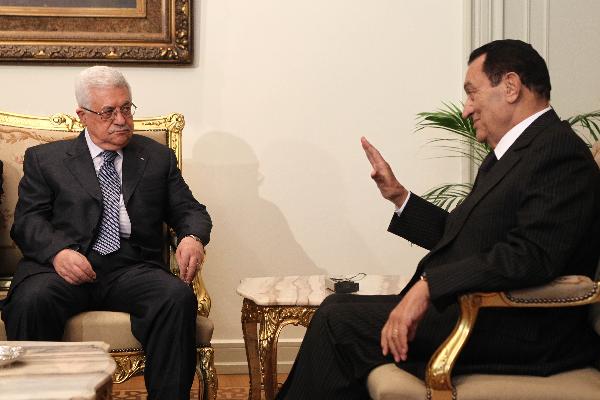Abbas: no talks before complete settlement freeze
Palestinian President Mahmoud Abbas Sunday reiterated that the Palestinian side will not accept a resumption of the direct talks unless Israel halts settlement constructions in the West Bank and in East Jerusalem.
 |
|
Egyptian President Hosni Mubarak (R) talks with his Palestinian counterpart Mahmud Abbas during their meeting in Cairo on November 21, 2010. [Xinhua] |
"We will do our utmost in order to reach a solution that could lead to establishing an independent state with East Jerusalem as its capital and settling the final status," Abbas said, adding two issues were mainly discussed during the meeting, namely, the possibility of resuming direct negotiations, and the developments of the inter-Palestinian dialogue.
Abbas said the Palestinian side is still waiting for an official response from the U.S. administration, hoping that such response would be issued soon in order to be discussed at the Palestinian level and then referred to the Arab Peace Initiative Committee.
The U.S. administration has proposed an incentive package including 20 F-35 stealth warplanes in return for freezing settlement construction for 90 days.
"We are not part of this deal," Abbas said, noting the deal is part of the strategic relations between Israel and the United States.
Abbas said that Palestinians have several options before seeking the UN Security Council, the first is the direct peace talks.
The U.S. State Department said Friday they were ready to offer Israel written security guarantees if it would help to restart the stalled peace talks.
U.S. National Security Advisor Uzi Arad told Israeli media on Saturday that the United States has given Israel a written guarantee that it won't pressure the Jewish State any further if the country accepts the 90-day settlement freeze proposal.
Early October, the Palestinians halted the U.S.-sponsored direct talks with Israel, four weeks after it resumed in Washington. The decision was made after Israel refused to extend a ten-month moratorium over freezing settlement that ended on Sept. 26.
Abbas had talked with Arab League Secretary General Amr Moussa and Egyptian intelligence chief Omar Suleiman on Saturday about the latest situation of the peace process.
Moussa Saturday said in a press conference that the Arab Peace Initiative Committee will meet once the U.S. stance on the peace process is known.
Israeli Prime Minister Benjamin Netanyahu on Sunday is expected to seek to convince members of the Israeli Knesset and deputy premiers from the Likud party on the matter. Jewish settlers gathered outside Israel's weekly cabinet meeting to protest against plans for a possible agreement on settlement freeze.
 0
0 







Go to Forum >>0 Comments